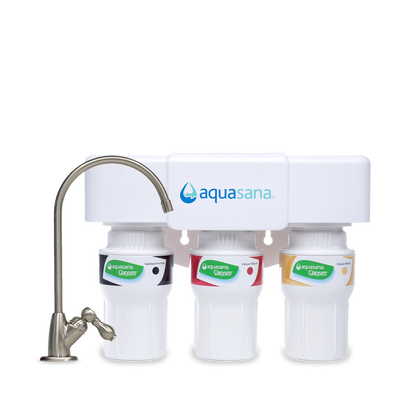Picture this: you’re at home, prepping your kitchen for a dinner party. You’re at the sink, draining and rinsing pasta, washing your vegetables, and filling up your guest’s glasses of water. They stop by, and before everyone digs in, one of them goes to taste their first sip of water and their faces go awry. “What’s wrong?” you ask. “This water tastes a little funky.” You go to taste a sip for yourself and confirm. It has a taste and odor that’s unmistakable — it’s chlorine. Yuck.
Water is used every day — more often and in more ways than you might think. But for many who get their water from their municipality, trace chemicals and minerals in water can affect the food that’s cooked in it. For example, chlorine — which many municipalities use in water treatment — can have a bleaching effect on vegetables and can leave an unsavory taste and odor in your glass of water, not unlike what we experienced at that dinner party.
That’s why using filtered water for cooking has become such an industry trade secret among chefs. Many prefer filtered water when cleaning their produce, cooking for customers, and even use filtered water to make ice for mixed drinks.
When interviewed for Punch magazine, Thomas Waugh, head of bar operations at The Grill (a rebranded restaurant born out of the old Four Seasons), had this to say:
“Using good water is really important for me in making a good Martini. And there’s a lot of sh*!ty water and ice in New York City.” Well, no duh.
Aquasana whole house filters won’t turn you into an instant chef, but they might leave friends wondering about your best-kept secret. Here’s how filtered water will improve your cooking, in more ways than one.
Aquasana whole house filters won’t turn you into an instant chef, but they might leave friends wondering about your best-kept secret.
Why Washing Your Produce Matters
Before they get washed, your fruits, vegetables, and other produce are like a little petri dish — a haven for bacteria, pesticides, and germs looking to find a new home.
In recent years, the Food and Drug Administration (FDA) has had to do several recalls on lettuces, like romaine and spinach, as well as many other fruits and veggies in an effort to prevent foodborne illness and outbreak. From January to June 2019, there have already been 144 food recalls total. And that’s just the first half of the year.
According to the FDA, for foods that aren’t even under recall, it’s still extremely important to wash your fruits and veggies before cooking with them.
“Glenda Lewis, an expert on foodborne illness with the Food and Drug Administration, says fresh produce can become contaminated in many ways. During the growing phase, produce may be contaminated by animals, harmful substances in the soil or water, and poor hygiene among workers. After produce is harvested, it passes through many hands, increasing the contamination risk. Contamination can even occur after the produce has been purchased, during food preparation, or through inadequate storage.”
But if you’re washing your produce with unfiltered water? You might as well be not washing them at all. Here’s why.
Washing and Cooking With Filtered Water: The Anti Dirty Little Secret
As we previously mentioned, whether you’re on well water or city water, the water in your home can contain many naturally-occurring contaminants, like iron, magnesium, and calcium. However, particularly if you’re on city water, it often contains chlorine or chloramines — compounds used to disinfect your water before your water even enters your home.
Even with that in mind, things like pesticides and herbicides that are often used to treat fruits and veggies on the farm and keep the bugs away might still be on your food after you rinse them off. Here’s how.
Pesticides travel through sewers that run from drains within the home, carrying all wastewater to treatment plants where they remain untreated throughout the detoxifying process. There are hundreds of different compounds with few tests and studies on how these contaminants may impact our health. So while you might be trying to clean your produce from the herbicides and pesticides used on the farm, you might still be washing them with water that contains the very contaminants you’re trying to rid your produce of.
Herbicides and pesticides aren’t your only problem, either. Chlorine might treat your water, but it doesn’t do a thing when it comes to chlorine-resistant cysts like cryptosporidium and giardia, pharmaceuticals, VOCs, lead and more.
Rinsing your pasta, cleaning your fruits and veggies, and cooking with filtered water means that none of those contaminants enter the food you eat or the water you drink. And that’s a game changer.
“Filtering your tap water is the first step to protecting your family from toxins on a daily basis, whether it’s for drinking, showering or cooking,” said Amy Myers, MD, an Austin-based physician specializing in functional medicine. “Government regulations focus on protecting us from the big health risks like waterborne bacterial diseases. The long-term health effects of chronic exposures to trace elements of contaminants in our drinking water are something we all need to take personal responsibility for.”
At the end of the day, you have the power. Investing in a drinking water filter, like a 2- or 3-Stage Under Counter Filter uses NSF Certified Claryum® Filtration to nix over 97% of chlorine and chloramines, and also works to reduce heavy metals like lead and mercury, those pesky chlorine-resistant cysts, herbicides, pesticides, VOCs and more — in fact, it reduces 15x more contaminants than the leading pitcher filter. Because no matter how your city treats your water, Aquasana treats it right.
